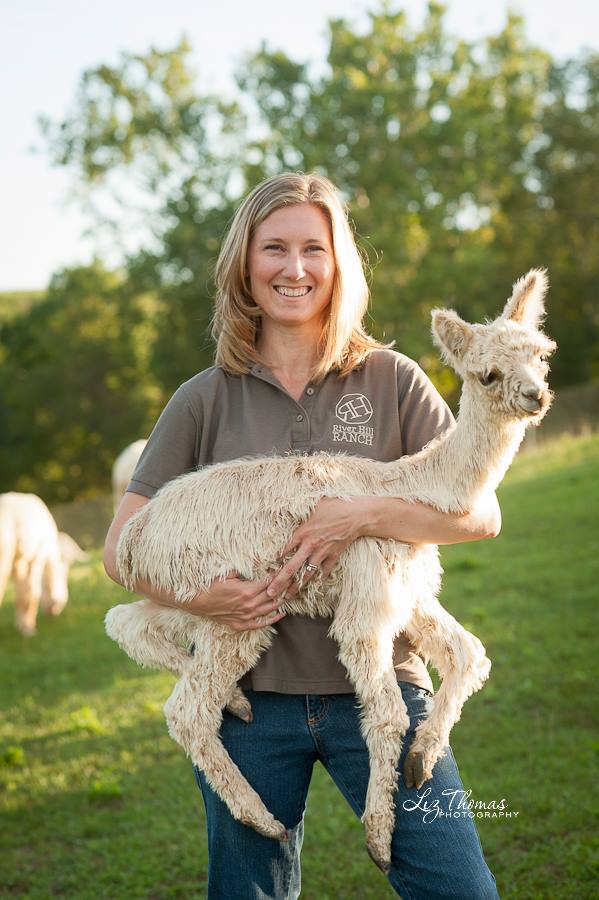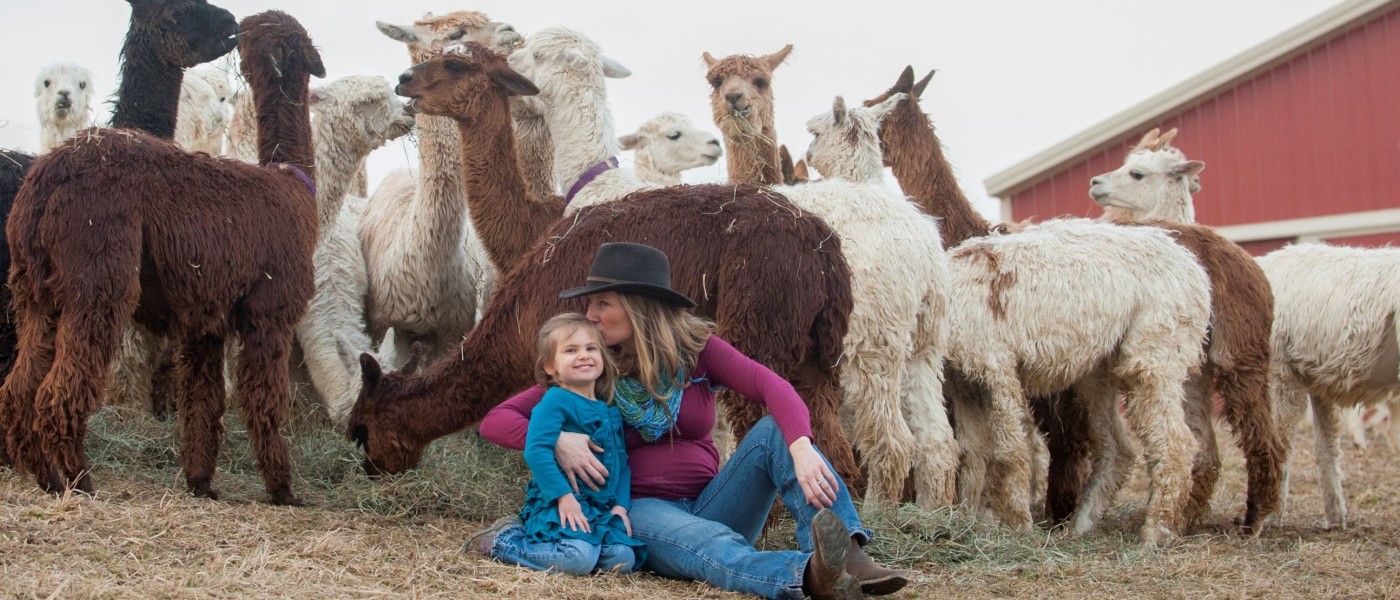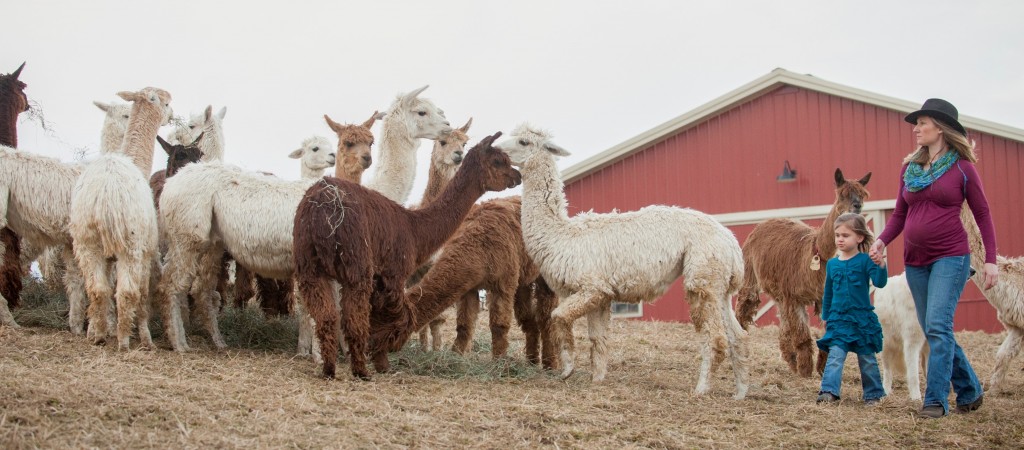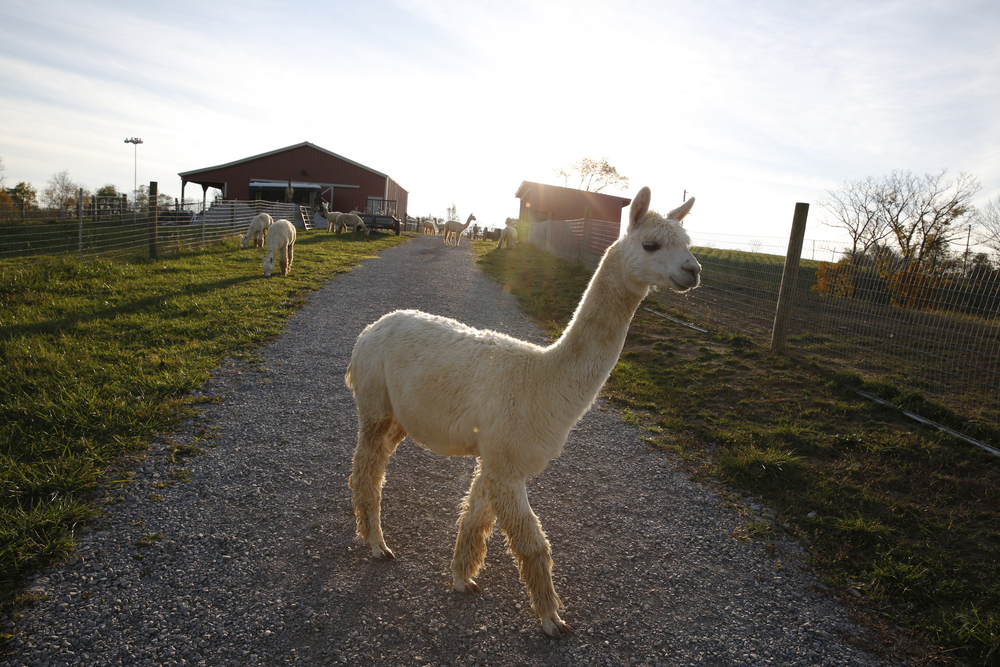Inspiration can come in many forms. For Alvina Maynard, owner and operator of River Hill Ranch in Richmond, Kentucky, that inspiration came in the form of a commercial for National Alpaca Farm Days.
“My husband and I were trying to figure out ‘what do we want to be when we grow up,’ and I saw a commercial for National Alpaca Farm Days,” said Alvina. “It was a very clear message after all the searching for my next career; it hit me that this was the answer.”
Alvina grew up on five acres of land in a “homestead-like environment,” in a rural town east of San Diego, California. Though her family did not consider themselves farmers, she says that looking back, all of the produce and animals that surrounded her certainly lent itself well to the life she leads now.

Photo by Liz Thomas Photography
After graduating high school, due to a combination of scarce finances and a spiritual pull to serve, Alvina joined the United States Air Force. While there, she jumped out of planes, traveled the country, taught backpacking skills to Boy Scouts, and found time to meet her civilian husband.
Leaving the military with some invaluable life skills, and a Master’s Degree in Organizational Leadership, Alvina joined her husband in traveling, hiking and exploring; trying to decide what their future would look like all the while. Continuing her commitment to serve, she became a reservist and they settled in her husband’s home state of Kentucky.
The “aha” moment that led Alvina to become an alpaca farmer still fits her family’s needs well. With two kids – Aidyn, 5 and Sean, 1 – having smaller animals that are typically docile allows her children to spend time with her around the farm.
“This is definitely a mom business,” said Alvina. “I had to have something where I could have my kids with me and they would be safe. The risk in farming alpacas is very small. At only about 140 pounds, they are easy for me to manage.”
Don’t be fooled, though, alpacas are by no means perfectly cooperating or easy animals. Their stoic nature makes it difficult to tell if something is wrong, as they hide any pain or illness well. The only way to make sure they stay healthy is to pay close attention to their moods and habits.
“They have a really unique nature… there are so many interesting things about these critters,” she joked. ‘They are just comical to watch.”
Although the alpaca industry is still relatively young in the U.S. (alpaca farming is much more common in South America), Alvina is excited to be part of something that she believes is very environmentally and financially sustainable, and has a lot of room to grow.
While most people think of alpacas for their fibers, which can be woven into almost anything, they also provide nutritious and tasty meat. As a bonus, their unique digestive system makes for great compost. Alvina makes good use of all the benefits that her alpacas provide.
“They have a really unique nature… there are so many interesting things about these critters. They are just comical to watch.”
River Hill Ranch sells alpaca meat to a few restaurants and specialty stores, and has also had great success at the downtown Richmond farmers market.
“Once people try it and realize how good it is, and I show them the nutrition facts about how good it is for you, it’s an easy sale,” she said.
The fibers from her alpacas are sold to domestic manufacturers, where they are used to make anything from yarn to socks and rugs. This is particularly important to Alvina, as she is a huge advocate for the Slow Fashion movement.
The Slow Fashion movement – much like the Slow Food movement – encourages consumers and retailers alike to think more about where our clothing comes from, how it is made (referring to both materials and work conditions), and its impact on our financial and ecological environment. Clothing made and sold in a localized geographic space helps minimize our carbon footprint, and helps to create local jobs with workers who are treated and paid fairly. Additionally, the Slow Fashion movement focuses on quality over quantity, something Alvina believes we have strayed very far from in our current textile industry.
“Too many garments are not made with materials that are made to last. Stores have gotten to a point where they have a six week turnaround period to get you back in the store buying something new,” she said. “You might pay a little more for a shirt [with natural fibers], but it will last you longer, fit better, and, once it has outlived its practical use will decompose at a quicker rate. Quality over quantity – we don’t need to wear a different outfit every day.”
In order to be a more conscious shopper, Alvina advises that we should be asking more questions and paying more attention. Check the tag on the garment; see where it’s made and what was used to make it. Do your research and locate stores that sell garments made in the USA with quality materials, or tell your local boutiques that you would like to see more of those items in their stores. Additionally, it’s important to hold company’s responsible for any unethical work conditions that compromise ethics for a cheap garment.
River Hill Ranch offers tours to visitors where folks can interact with the herd, learn more about how sustainable clothes are made, and even visit the shop to pick up some alpaca goodies.
Despite being a busy mom, wife and alpaca rancher, Alvina still makes time to think about the future and is constantly envisioning new ways to be more sustainable in everything her farm does.Her current goal: make use of every aspect of her animals.
This means finding ways to use the lower-quality fibers that are found on alpaca’s neck and lower legs. Right now, she sends the material to another local female farmer and veteran, who spins the fiber into rugs.
“Normally that fiber would get thrown away, but when people feel it in the rug, they are amazed by how soft it is,” she said.
Alvina is a huge supporter of Homegrown by Heroes for products grown, raised and produced by hardworking farmer veterans – individuals who have dedicated their lives to feeding the nation. The label is a program of the Farmer Veteran Coalition, which trains military veterans to become farmers. Their mission serves two needs: helping veterans readjust to society after enduring tremendous trauma and hardships while serving, while at the same time combatting the crisis of our aging farmer population by bringing new farmers to the land.
“While there are plenty of therapy programs for support, farming offers a new mission, a new way to serve our communities, a community among other farmers, and the healing property of working with our hands, the land, and animals,” Alvina said. “Folks can help by looking for and requesting Homegrown by Heroes products as well as spreading the word both to other consumers and to military vets.”
Being a veteran provides unique experiences and skills that translate well to farming. For Alvina, she says being in the U.S. Air Force taught her how to be flexible, to find humor in stressful situations, and to grin and persevere when things get tough.
“My husband and I are both recovering perfectionists,” she laughed. “We both want so badly for things to go perfectly, but farming is perfectly imperfect. That’s probably been my biggest life lesson. Just let things go and be at peace with the imperfection. I’m learning to appreciate it.”
And appreciate it she does. It all started with the question of “what do I want to be when I grow up?” And her answer — which included being outside with her family and working in harmony with nature – led her to a home with a big front porch, tucked away in the rolling Kentucky hills, inhabited by quirky, furry animals that have given her family happiness and stability.
“We regularly sit at the breakfast table, which looks out into my farm, and we won’t be actively engaged in discussion, but we will just randomly say, ‘I love my farm,’” she said proudly. “There are a lot of comparisons between farming and parenting. Despite the frustrations, there are so many more blessings. It is so worth it.”
Visit River Hill Ranch's websiteFurther Reading
- Read more about the Slow Fashion movement in this article from NPR.
- Learn about the Farmer Veteran Coalition.






